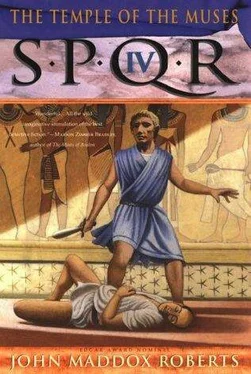John Roberts - Temple Of Muses
Здесь есть возможность читать онлайн «John Roberts - Temple Of Muses» весь текст электронной книги совершенно бесплатно (целиком полную версию без сокращений). В некоторых случаях можно слушать аудио, скачать через торрент в формате fb2 и присутствует краткое содержание. Жанр: Исторический детектив, на английском языке. Описание произведения, (предисловие) а так же отзывы посетителей доступны на портале библиотеки ЛибКат.
- Название:Temple Of Muses
- Автор:
- Жанр:
- Год:неизвестен
- ISBN:нет данных
- Рейтинг книги:5 / 5. Голосов: 1
-
Избранное:Добавить в избранное
- Отзывы:
-
Ваша оценка:
- 100
- 1
- 2
- 3
- 4
- 5
Temple Of Muses: краткое содержание, описание и аннотация
Предлагаем к чтению аннотацию, описание, краткое содержание или предисловие (зависит от того, что написал сам автор книги «Temple Of Muses»). Если вы не нашли необходимую информацию о книге — напишите в комментариях, мы постараемся отыскать её.
Temple Of Muses — читать онлайн бесплатно полную книгу (весь текст) целиком
Ниже представлен текст книги, разбитый по страницам. Система сохранения места последней прочитанной страницы, позволяет с удобством читать онлайн бесплатно книгу «Temple Of Muses», без необходимости каждый раз заново искать на чём Вы остановились. Поставьте закладку, и сможете в любой момент перейти на страницу, на которой закончили чтение.
Интервал:
Закладка:
"That is so."
"Might you have a copy?"
He nodded gravely. "Yes. We have copies made of every book that comes to the Library. This spares excessive handling of the more valuable originals."
"Yet Iphicrates insisted upon the original?"
"He was most insistent. He said that he did not wish to cope with the inevitable copier's errors."
"I see. Might I have a look at a copy?"
"Certainly, Senator." I followed him to a nook where scores of scrolls rested in their racks, labels dangling from their handles. He scanned the rack expertly and plucked a scroll from its resting place. It was a good deal smaller than the massive original I had seen in Iphicrates's study.
"Is it in a single volume?" I asked.
"Yes, it isn't a lengthy work. If you wish to peruse it, please unroll it carefully. It probably hasn't been looked into since it was made here nearly a century ago."
"How does the Museum happen to have the original, since it was dedicated to Attalus I of Pergamum? I would think it would be among the Pergamese collection." The rulers of Pergamum had founded a library in imitation of the Alexandrian, and in those days it still had a reputation second only to the original.
"An earlier Ptolemy: ah: borrowed it in order to have a copy made. Through an oversight, an excellent copy was returned, rather than the original."
"Has this been a common oversight?" I asked.
"Well, we do have several thousand original manuscripts from that library."
It figured. King or foot soldier, all Macedonians are thieves.
"There are a number of vacant tables, Senator, if you wish to read the book now."
"Actually, I would rather take it to the embassy and read it at my leisure, if that is permitted."
"We really prefer not to lend volumes outside the Library, Senator. Now that the original has disappeared, this is the only copy we have."
"If my investigation is successful," I said, "I think it very likely that I will be able to return the original to you." I kept the scroll in a tight grip.
"Well, that being the case, and in view of our sovereign's eagerness to please Rome in any way he may, I think we can make an exception in this case."
"You have my heartiest thanks, and those of the Senate and People of Rome," I assured him.
Back at the embassy, I called on Creticus. I found him going over correspondence from Rome and elsewhere in the Empire.
"If you don't mind, sir, I think I'd like to take a few days to do some hunting."
He looked up suspiciously. "Since when did you like to do anything more strenuous than watch other people race chariots? What are you up to?"
"I just need a bit of exercise. Too much of the good life, as it were."
"It's not as if you do much necessary work around here. Will you take Julia with you?"
"I don't think that would be proper, sir. We're not married yet."
"You're concerned about respectability? Now I know you're hiding something. What happened to this murder investigation of yours?"
"It will hold for a few days."
"Go, then. Stay out of trouble."
Hermes was no less amazed when I told him.
"Hunting?" he said. "You mean, hunting animals?"
"What else is there to hunt? Except for runaway slaves?"
"You've never done this before."
"All the more reason to start now. Go find us some hunting gear. This place has clothing and equipment for every sort of activity. We leave tomorrow as soon as it's light enough to see." Muttering and shaking his head, he went to do my bidding.
I found a comfortable corner and a pitcher of wine and settled down to delve into Biton's book. I slipped off its stiff leather cover and carefully began to unroll the crackling scroll. Unlike the original, this copy was made on Egyptian papyrus, another reason for its reduced bulk.
Biton began with a disquisition upon the history of war machines. These had been relatively rare and simple among the Babylonians and Egyptians and even rarer among the early Greeks. The Greek army that besieged Troy had not used them except for the wooden horse, which was not the same thing. But as men increasingly fought over fortified cities, these engines became necessary. At first they were mere towers for storming walls, covered galleries on wheels to protect rammers, and the various forms of missile-hurling device. Alexander's battles had mostly been of the open-field sort, and he had rarely resorted to engines.
Then came the Successors. These men had no new land to conquer, but they fought interminably among themselves over the carcass of Alexander's empire. This consisted primarily of seizing each other's ports, fortresses and capital cities. Such warfare called for engines, and to this endeavor the Successors brought the same mania for size and complexity that they brought to building.
Most notable of these was Demetrius Poliorcetes, "the Besieger," son of Antigonus One-Eye and the greatest military hobbyist of all time. He designed some of the strangest and certainly the largest engines of war ever conceived. He mounted storming towers on yoked ships for assaulting harbor walls. He built towers a hundred feet high equipped with dozens of catapults and completely plated with iron.
Others were not far behind. Dionysus, tyrant of Syracuse, had formed a sort of academy of military arts where the best engineers worked on engines and new designs of warship and new types of weapons and armor.
All this military experimentation had come to an end with the ascendancy of Rome. We beat them all because we knew that the ultimate weapon is the Roman legionary and the organization of the Roman legion. With them, even mediocre generals turn in victory after victory with monotonous regularity. An inspired general like (even now I hate to admit it) Caesar could accomplish marvels. And the Successors cared only about fighting. It was all they were good for. Romans value law and sound rule. But somebody believed that this inevitable tide of Roman rule could be reversed, and they thought that possession of some magic weapon would give them victory over the invincible legions.
There followed a lengthy text, with drawings, of the various engines, including the fanciful monsters of Demetrius. A final section concerned the defenses designed for Syracuse by the great Archimedes. The incendiary reflectors were mentioned, although there was no description of them. The ship-lifting crane Iphicrates had ridiculed was not mentioned. That, apparently, was an invention of later tale-tellers. There was a cranelike device made to swing out over the harbor and drop heavy weights upon the attacking ships, smashing through deck and hull to sink them. Perhaps that was the origin of the story.
When I was finished, the light was dim and my pitcher was almost empty. It had been fascinating reading, but it had not explained some things. I still did not know why the murderer had taken the scroll. Surely he knew there was at least one copy, and doubtless there were others in other lands. Might Iphicrates have written in the original? That seemed unlikely. The Librarians would have regarded it as a desecration. The text and drawings would have been extremely useful to a captain of engineers with a city or a fort to besiege, but I saw nothing in the book that would convince even the most gullible would-be conqueror that here was something that would tip the balance against the might of Rome. There had to be more, and it had to be in the original manuscript of Biton, dedicated to Attalus more than a century before.
Chapter VII
By lamplight, I dressed in the hunting garments Hermes had found in the well-stocked embassy wardrobe. The tunic was a dark rust-red, with twin stripes of olive green running from the shoulders to the hem. The high boots of red leather were elegantly topped with spotted serval skin, with the dainty paws dangling over the shins. It made a dashing outfit, and I was sorry that Julia wouldn't have the opportunity to see me wearing it.
Читать дальшеИнтервал:
Закладка:
Похожие книги на «Temple Of Muses»
Представляем Вашему вниманию похожие книги на «Temple Of Muses» списком для выбора. Мы отобрали схожую по названию и смыслу литературу в надежде предоставить читателям больше вариантов отыскать новые, интересные, ещё непрочитанные произведения.
Обсуждение, отзывы о книге «Temple Of Muses» и просто собственные мнения читателей. Оставьте ваши комментарии, напишите, что Вы думаете о произведении, его смысле или главных героях. Укажите что конкретно понравилось, а что нет, и почему Вы так считаете.









